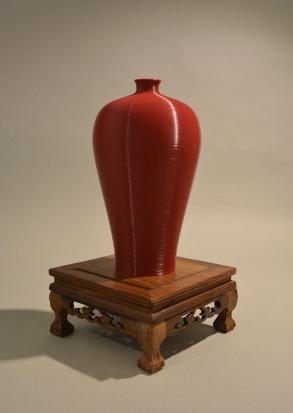
10 minute read
Warren Johnson Prize Winner
from Blue Flag 2020
NINA SLOAN The Warren Johnson Prize Winner
Fallen Father
Is Shakespeare’s The Merchant of Venice anti-semitic? In truth, the play paints Judaism in an unflattering light––the most prominent Jew in the play, Shylock, is deeply flawed––but Shakespeare is no less critical of Christianity. Despite Shylock’s faults, Shakespeare casts him alongside characters with similar imperfections. Thus, the central contrast between the play’s characters lies not within innate heroism or villainy; instead, the play examines how someone comes to be perceived as righteous or evil. The nature of a Jew and the nature of a Christian are often indistinguishable, and as a result, their relative power and privilege over one another relies on the climate they live in. In The Merchant of Venice, it is societal convention––not inherent morality––that dictates the fate of its characters. Shakespeare demonstrates this concept through an extended biblical metaphor, one he introduces early in the play. When Antonio and Bassanio ask Shylock if he will charge them interest on the three thousand ducats, Shylock responds with a rather obscure biblical tale detailing Jacob creating “interest” out of Laban’s sheep. During this speech, he says: “[Jacob] pilled me certain wands…” (1.3, l. 92). Though the insertion of “me” into his speech functions as an ethical dative, it also incorporates Shylock into the story he tells. Jacob, in essence, “pilled” the “wands” for Shylock. In doing so, Shylock reminds Antonio of his religious ancestry; he evokes the influence of Jacob/Israel, and simultaneously excludes Antonio and Bassanio from
87
claiming the same ancestry (in saying “me” instead of “us”). He goes so far as to equate himself with Jacob; though his whole speech compares Jacob’s actions with his own, the use of “me” places himself more personally within Jacob’s narrative. When considered alongside other details––Shylock “[swears] by Jacob’s staff” (2.5, ll. 37) and his wife’s name was “Leah” (3.1, l. 120)––this speech establishes that he is Jacob in the context of the play.¹ After casting Shylock as Jacob, Shakespeare extends the metaphor to Lancelet; just as Esau serves Jacob in the Bible, Lancelet serves Shylock. Lancelet also mentions he is “famished in [Shylock’s] service” (2.2, l. 106), mirorring how Jacob withholds food from a starving Esau in order to steal his birthright. There are undeniable biblical parallels in Lancelet and Gobbo’s conversation, to the point that Act II, Scene 2 can be considered a reenactment of Esau asking Isaac for his blessing. Gobbo’s “sandblind[ness],” Lancelet’s “beard,” and, of course, Lancelet’s request for his father to “give [him his] blessing” (2.2, l. 76)––all of these mimic classic elements of the original story. In the Bible, however, when Esau asks if a blessing was “reserved for him,” Isaac instructs him to serve his brother, Jacob. Lancelet and Gobbo’s conversation directly subverts this expectation: instead, Lancelet asks his father to release him from his servitude to Shylock so as to serve Bassanio, a Christian. It is also important to note that the Edomites––Esau’s descendants––were seen as distinctly different from the ––––––––––––––––––––––––––––¹ I would even argue that Shylock’s role as Jacob hints at a play within a play: in Act I, Scene 1, Antonio says, “The world [is] / A stage where every man must play a part, / And mine a sad one,” to which Gratiano responds, “Let me play the fool” (1.1, ll. 814). Just as Shylock characterizes himself as Jacob, Gratiano chooses to “play the fool.” In Act I, the characters cast themselves as certain roles. If it really is a play within a play from that point on, that would imply a lack of agency on the characters’ parts––their fates are predetermined once their roles are cemented.
88
Israelites: the Edomites were neither Jewish nor Christian. Thus, their allegiance to a certain religion depended on circumstance rather than ideology. Lancelet’s decision to abandon Shylock relies on this characteristic, and his speech as he considers whether or not to leave is perhaps most revealing of the play’s ambivalence regarding religion. Despite being set in an overwhelmingly anti-semitic society, Lancelet seems to judge Christianity and Judaism equally. Though he considers Shylock “a kind of devil,” he also says that a “fiend”––in other words, Christian intolerance of Judaism––“tempts” him to leave.² Both Christianity and Judaism have the potential for evil, and, thus, Lancelet cannot find a satisfactory answer to his problem. Furthermore, of all the Christian characters, Lancelet concerns himself least with the appearance of piety and blind allegiance to Christianity. Unlike the more devout Christians in the play,³ Lancelet displays little investment in Jessica’s conversion, saying: “This making of Christians will raise the price of hogs: if we grow all to be pork-eaters, we shall not shortly have a rasher on the coals for money” (3.5, ll. 22-5). A truly devout Christian would rejoice at her conversion––after all, proselytization is the religion’s hallmark––but Lancelet seems not to care either way, only remarking on how the price of pork might go up. In addition, Shylock’s reference to Lancelet as “Hagar’s offspring”⁴ (2.5, l. 45) paints a picture of Lancelet as someone who is only Christian in name, and an outside observer in the play. This allows him to take a less biased view of Judaism and Christianity, contextualizing the dissonance he feels regarding Jews and Christians. ––––––––––––––––––––––––––––² Potentially a reference to temptation in Genesis. ³ Specifically Antonio, considering how he forces Shylock to convert to Christianity. ⁴ This could also be a reference to Lancelet’s race, rather than his religious heritage. 89
Perhaps Lancelet’s relative lack of prejudice stems from a more flexible approach to faith, allowing him to see the world without a preference for one type of person. But even Portia––despite upholding purported Christian ideals––briefly assumes the same impartial role as Lancelet in Act IV, Scene 1; because of her isolation from the Venetian world, she cannot tell the difference between Antonio and Shylock when she arrives at the courthouse, asking “Which is the merchant here, and which is the Jew?” (4.1, l. 176). Though this question resolves itself soon enough, it hints at the similarities displayed between Jews and Christians throughout the entire play: neither can claim superiority over the other, because the best parts of Christianity are present in Judaism, as are the worst. As Shylock and Portia battle over Antonio in Act IV, Scene 1, both demonstrate the worst of their respective peoples. Their behavior in this scene conforms to one of Bassanio’s musings earlier in the play: “In law, what plea so tainted and corrupt / But, being seasoned with a gracious voice, / Obscures the show of evil?” (3.2, ll. 77-9). Here, “a gracious voice” can be interpreted as adherence to the law––a “plea” cannot reasonably be denied when it appeals to a system that supports it. As Shylock argues for the fulfillment of his bond, he employs these legal principles to justify an undeniably immoral act. Portia initially exploits a legal loophole to achieve a moral result; had she stopped after saving Antonio’s life, she would undoubtedly be the more ethical of the two. However, she continues on to strip Shylock of his wealth, his faith, and even threatens him with execution. Portia prevails over Shylock not because she is more virtuous, more honorable, but because she works within a system which allows her to accomplish her goal.
90
Prior to his first conversation with Antonio, Shylock asserts, “If I can catch [Antonio] once upon the hip, / I will feed fat the ancient grudge I bear him” (1.3, ll. 46-7). Though this line references Shylock’s desire to punish Antonio for his behavior towards him, it also alludes to Jacob once again. In the Bible, Jacob wrestles with an angel until, at daybreak, the angel catches Jacob on the hip. When Jacob refuses to let the angel go, the angel renames him Israel; this marks Jacob’s birth as a father of Judaism. Shylock, as a modern⁵ Jacob, follows an inverted path. In the courtroom scene, Portia “[catches Shylock] on the hip”⁶ and forces him to convert to Christianity. She strips Shylock of his livelihood, his religion, and his name.⁷ The original biblical story follows Jacob’s rise to power, but The Merchant of Venice tracks Shylock’s fall from favor.⁸ If Shylock is an inverted Jacob, then a new “Jacob” must take his place––a role filled by Portia. Portia facilitates Shylock’s fall, specifically through depriving him of his wealth. As Shylock references early in the play, “Thrift is blessing if men steal it not” (1.2, l. 98). Shylock’s career as a moneylender rewards thrift, therefore qualifying it as a “blessing” to Shylock. By characterizing his thrift as his blessing, Portia’s theft of Shylock’s wealth begins to resemble Jacob’s theft of Esau’s blessing. Portia even mirrors the tactic Jacob uses, donning a disguise when ar-
––––––––––––––––––––––––––––⁵ Modern in the 16th century. ⁶ Gratiano even explicitly references this in his interjections: “Now, infidel, I have you on the hip” (4.1, l. 348). ⁷ Metaphorically, of course––in becoming a Christian, Shylock can no longer be considered “Israel.” ⁸ As a generalized figure, Shylock’s fall could signify the erosion of Judaism as a prominent religion. Jessica’s conversion to Christianity anticipates this––Jacob’s transformation into Israel relies upon him continuing the bloodline of the Jewish people. When Jessica strays from Judaism, it undermines Shylock’s responsibility as a Jewish father and as Jacob. 91
guing in court. Just as she masks her relatively unethical intentions with legal expertise, (“obscuring” her “tainted and corrupt [plea]”), she conceals her physical appearance. In some ways, her success against Shylock means she will supplant him––without his blessing, Shylock can no longer call himself Jacob, and Portia (possessing said blessing) can lay claim to the role. Shakespeare’s decision raises the question: what justification is there for this inversion? Shylock is by no means perfect, and perhaps deserved to be punished for his wrongdoing. After all, he did intend to kill a man. But what about Antonio, Bassanio, and Portia? Their sins remain largely unaddressed by the play’s conclusion, and no perfect character, no utterly righteous prophet emerges to demonstrate the fallacy of their ways. It cannot be explained away by an anti-semitic Shakespeare either––as previously established, The Merchant of Venice critiques religion as a whole, not just Judaism. Why then, is there such an imbalance between the fate of Jews and Christians? The answer traces back to Merchant’s biblical source. Jacob had no claim to Esau’s birthright or his blessing, but the Bible sanctions the theft despite the official immorality⁹ of such an action. Jacob’s power over Esau has little to do with unequivocal supremacy; rather, it relies on which of the two happens to possess societal favor. Though Merchant’s Christians have no true moral high ground to its Jews, the Christians have become God’s chosen people and therefore become exempt from the same restrictions that Jacob was. Antonio and Portia need not
⁹ See the Eighth Commandment: “Thou shalt not steal.” Though Jacob would not have personally known the Ten Commandments, they were certainly set in stone (pun intended) by the time Shakespeare wrote his play. It is reasonable to assume the same values were present in Jacob’s story, even if God had not yet spelled them out.
92
repent for stealing Shylock’s “blessing,” because, in essence, society allows it.¹⁰ It does not matter whether Jews act righteously or wickedly––Christians have replaced them as the chosen ones and, thus, Jews must defer to them. Altogether, Shylock’s story ends pitifully. But, compared to more extreme opinions of the time, Shakespeare produces a remarkably sympathetic portrayal of the Jewish people––their misfortune is not caused by empirical inferiority, but by the nature of the world they live in. Thus, the inequity they face cannot be excused by supposed inadequacy. The Merchant of Venice serves not as a condemnation of Jews or a laudatory tale of Christian triumph; rather, it is a matter-of-fact dramatization of how arbitrary God––or life––can be. On the surface, this may be a feeble, even flippant explanation for the adversity Jews faced, but for its time, it was nothing short of remarkable. It is a direct rebuttal of the era’s common convictions: that Jews deserved to be punished for not conforming to Christian ideals. In its famous assertion––“Hath not a Jew eyes? Hath not a Jew hands, organs, dimensions, senses, affections, passions?... cooled by the same winter and summer as a Christian is?” (3.1, ll. 5763)––Merchant persuades its audience to compassion. In defying the expectations set forth by Jacob’s story, Shakespeare upends the expectations of his audience; in portraying Shylock’s fall, he demonstrates Shylock’s humanity.
¹⁰ Shakespeare deliberately evokes Jacob’s biblical narrative, doing so often enough that it can be considered integral to the play––in so clearly setting up the bones of this story, Shakespeare implies some sort of divine condonation. Since there is no overt reference to God’s involvement in the play, society assumes the role of an overarching power, deciding between right and wrong.
93







